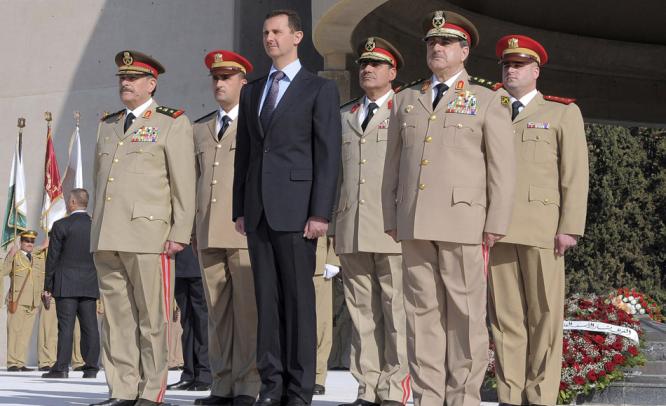The United States has confirmed that Syrian Forces are resorting to chemical warfare to crush the rebellion.
16th June 2013
International Finance Magazine reports the breach of “red line” by the Syrian government, request of military support by the rebels, strategy of the Syrian government to combat the opposition through chemical warfare and the financial losses Syria has incurred as a result of the two year war.
The Whitehouse has said that it has conclusive evidence that the Syrian government headed by President Bashar al Assad’s regime is resorting to the use of chemical weapons in the fight against its own people. Chemical weapons have been used on a “small scale” to kill at least 150 people, crossing what President Barack Obama had marked as a “red line” for US. Intervention in the conflict.
Deputy National Security Advisor for Strategic Communications, Ben Rhodes in a written statement said “ Following a deliberative review, our intelligence community assesses that the Assad Regime has used chemical weapons including the nerve agent sarin, on a small scale against the opposition multiple times in the last year, ”. “The use of chemical weapons violates international norms and crosses clear red lines that have existed within the international community for decades”.
Syria’s rebels protesting against the government are seeking antitank and anti aircraft weaponry to counter a government offensive that is backed by Hezbollah fighters and Iranian military forces. Obama had warned Syria on the use of chemical weapons which would cross a “red line” for the United States. The ongoing civil war has resulted in nearly 90,000 deaths and severely damaged the Syrian economy.
Military Support
The U.S. President has also authorized to send U.S. weapons to Syrian rebels for the first time. The Whitehouse said Washington would provide “direct military support” to the opposition, but it was not clear whether it would include lethal aid. The main rebel fighting force, Free Syrian Army (FSA) is seeking sophisticated weapons and anti aircraft war and other weaponry. FSA chief Salim Idriss has requested US and European officials for urgent military help to fight the government forces.
George Sabra, acting leader of the National Coalition Political Opposition Bloc said “We want anti-tank and anti-aircraft weapons”. U.S. Senator John McCain suggested a ‘no fly’ zone to neutralize Assad’s air power.
Western governments had predicted that Assad’s power had weakened and he could fall anytime. However, support from Tehran and Hezbollah are giving him the crucial support to fight the opposition. US Intelligence officials are worried that sending arms to the Syrian opposition forces could empower Sunni Insurgent groups who are loyal to the Al Qaeda. Some of them argue that U.S. support should not go beyond providing non-lethal support, a ploy that France has already employed. The Syrian conflict would be among the main topics for consideration for Obama at the G-8 summit schedule to be held in Northern Ireland next week.
Home of Chemical Warfare
The government in its defence has said that the rebels are using the chemical weapons and not the government forces. It has refused any intervention by the United Nations in the matter including allowing UN inspectors into the country to verify whether chemical weapons were used. The UN had alleged that the Syrian forces were using Sarin against the Rebel forces. In April, the head of Israeli Military Intelligence had said that the Syrian government is using chemical weapons against the FSA. Sarin gas, chemical formula (C4H10FO2P) is hard to detect as it is colorless, tasteless and odorless. The usage of Sarine results in paralysis, convulsions and death ultimately.
Analysts and Intelligence forces believe that Syria possesses one of the largest stockpiles of chemical weapons in the world. It includes VX gases, mustard and sarin which are banned under international laws. The chemical weapons convention prohibits the production, stockpiling and the use of biological weapons. Incidentally, Syria has not signed the convention. The Syrian forces are removing the chemical warfare inventories to undisclosed locations, primarily due to the deteriorating security in the country. U.S. and its allies are concerned that the weapons may ultimately fall in the hands of “Al Qaeda” the terrorist group supporting Syrian forces.
Financial Losses
Syria’s economy has suffered massively due the war and the damage caused by two years of fighting could go up to more than $ 80 billion. Trade deficits, Forex capitulation and rising budget are the immediate financial issues to the war ravaged state. Unemployment levels have soared to 33 percent from 8.3 percent. The agriculture industry which contributed nearly 18 percent of the annual GDP is in bad shape. Around 8 million people depend directly on Agriculture for their livelihood in Syria. The U.N. Food and Agricultural Organization has called for an emergency aid to revive the sector. The tourism sector which contributes 5 percent of the GDP is also taken the ill effects of the war. The oil sector which produced nearly 400,000 barrels of oil everyday has suffered immensely due to the international sanctions on Syria which limits its capacity to refine oil. The Assad government has increased the prices of gasoline by 62 percent and oil by 106 percent.

